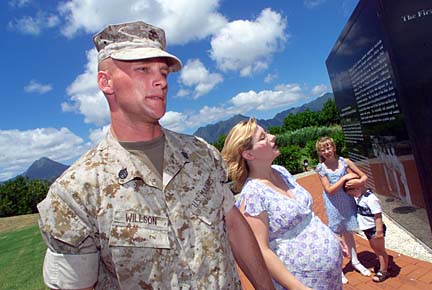
Staff Sgt. Charles Willson was one of 20 Marines who returned to Kaneohe from Iraq on July 12. Pictured in the back is his wife Kris, daughter Cori, 8, and son Tyler, 3. Willson kept in touch through e-mail but says he spared his wife many of the details of daily combat operations. The Marines say they were constantly on the watch for improvised explosive devices or indications of impending trouble. One telltale sign: when children suddenly disappeared from the street.
Isle Marines recall
tense duty in IraqFighting in Fallujah kept a group
from the 3rd Radio Battalion
continually on edge
Kris Willson shied away from watching TV news or reading news stories about the uprising in Iraq, especially in Fallujah, where her husband was stationed for five months.
"I chose not to follow it (the war) while he was gone," said Willson, who is expecting their third child in September.
Her husband, Staff Sgt. Charles Willson, and 19 other Marines returned to Kaneohe on July 12 after five months in Iraq. A few Marines and their family members talked to the media yesterday about the experience.
Sgt. Willson, motor transportation maintenance chief with the 3rd Radio Battalion, said, "Usually, I wouldn't tell her until it (an operation) was over, or I would downplay it."
Willson, an eight-year veteran, was among the 160 Marines who left Kaneohe in February for duty with the 1st Marine Expeditionary Force out of Camp Pendleton in Southern California. Their mission was to provide communications support for intelligence units and to conduct electronic warfare. The rest are scheduled to come home later this summer.
The violence in Fallujah, 35 miles west of Baghdad, escalated in late March after four U.S. security contractors, including Wesley Batalona, of the Big Island, were killed and their bodies mutilated. The Marines then led a major U.S. offensive, resulting in bloody street fighting.
Willson, 27, said the situation was stressful.
"There was a lot of uncertainty. We were nervous since we didn't know what to expect next. ... Daily there were indirect fire attacks on the camp we were in -- usually rockets and mortars."
For Sgt. Gary Cisneros, 32, it was his second Iraqi tour in 10 months. Like other members of the 3rd Radio Battalion, Cisneros worked with a small team of Marines and was always on the go. Although he was based in Fallujah, Cisneros estimated that he roamed over 350 square miles in the area known as the Sunni Triangle.
However, this combat tour was far different from the three months he spent in Iraq beginning on Feb. 9, 2003.
"The atmosphere was more deadly this time," said Cisneros, who has been in the Marine Corps for 12 years. "The first time, we knew who the enemy was. The second time, we didn't know who the enemy was. ... It could the same people, who in the day was helping us, but at night they could be the same people shooting at us.
"We were constantly looking for things along the side of the road which had things sticking out," added Cisneros, who was describing improvised explosive devices.
The other tell-tale sign was Iraqi children.
"When they would disappear," said Cisneros, 32, "you knew you were in trouble. They always knew when something was about to happen."
Both Kris Willson and Deanna Cisneros said it was e-mails that kept them in constant contact with their husbands during the last five months.
"I e-mailed him almost daily," said Kris Willson, "and once a week, he would call, but it was expensive."
